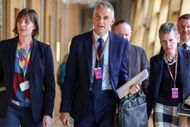Following the controversy over an edited speech by President Donald Trump, BBC director general Tim Davie and the CEO of BBC News, Deborah Turness, have both resigned from their positions.
This decision comes after the backlash Davie faced after being accused of the US president's January 6 speech in 2021. According to a leaked memo written by Michael Prescott, a former independent adviser to the BBC’s Editorial Guidelines and Standards Committee (EGSC), the BBC wanted to make it seem as if the president was encouraging the 2021 Capitol riot. The claims were published by The Telegraph.
Concerns were raised after the Panorama documentary Trump: A Second Chance? was broadcast last year. The documentary was made for the BBC by independent production company October Films Ltd.
In his speech in Washington, DC, on that day, Trump said,
"We're going to walk down to the Capitol, and we're going to cheer on our brave senators and congressmen and women."
However, in the film's edited version, he was shown saying
"We're going to walk down to the Capitol... and I'll be there with you. And we fight. We fight like hell."
Both parts that were stitched together were more than 50 minutes apart.
Who is Tim Davie?
Tim Davie, whose full name is Timothy Douglas Davie, served as the 17th director-general of the BBC from September 2020 until now, resigning after 20 years. He first joined the BBC in 2005, and his first role was director of its marketing, communications, and audiences division.

In a memo sent to the staff on Saturday, Tim Davie boldly expressed that the decision to leave was entirely his. He further wrote about taking responsibility for his actions,
“In these increasingly polarised times, the BBC is of unique value and speaks to the very best of us. It helps make the UK a special place; overwhelmingly kind, tolerant and curious. Like all public organisations, the BBC is not perfect, and we must always be open, transparent and accountable. While not being the only reason, the current debate around BBC News has understandably contributed to my decision. Overall the BBC is delivering well, but there have been some mistakes made and as Director-General I have to take ultimate responsibility.”
Deborah Turness also wrote a letter to the staff, stating her role in this entire situation. She wrote,
“The ongoing controversy around the Panorama on President Trump has reached a stage where it is causing damage to the BBC — an institution that I love. As the CEO of BBC News and Current Affairs, the buck stops with me — and I took the decision to offer my resignation to the Director-General last night. In public life leaders need to be fully accountable, and that is why I am stepping down. While mistakes have been made, I want to be absolutely clear recent allegations that BBC News is institutionally biased are wrong.”
This was followed by concurrent statements by BBC Chairman Samir Shah, who thanked both Davie and Turness and wrote,
“I understand the continued pressure on him, personally and professionally, which has led him to take this decision today. The whole Board respects the decision and the reasons for it."
And U.K. culture secretary Lisa Nandy of the ruling Labour Party, who expressed in her statement,
“I want to thank Tim Davie for his service to public service broadcasting over many years. He has led the BBC through a period of significant change and helped the organisation to grip the challenges it has faced in recent years.”
She further added, “As a government, we will support the board as it manages this transition and we will ensure that the Charter Review is the catalyst that helps the BBC to adapt to this new era and secures its role at the heart of national life for decades to come.” The charter, which gets renewed at regular intervals, defines the BBC’s purposes and governance.
Now the question arises, who will take over the position that Tim Davie has stepped away from? The director general is appointed by the BBC Board, which is led by chair Samir Shah and 10 non-executive members, plus four executive members, including the director general. When Tim Davie was elected in 2020, the selection was led by the BBC Board’s nominations committee.
